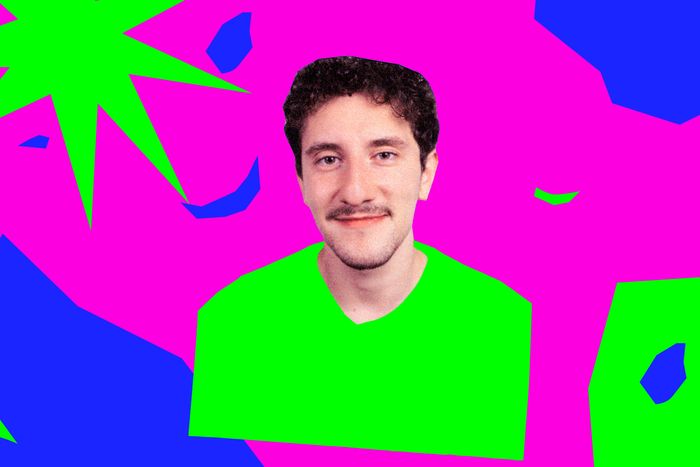
This week, we’re highlighting 24 talented writers and performers for Vulture’s annual list “The Comedians You Should and Will Know.” Our goal is to introduce a wider audience to the talent that has the comedy community and industry buzzing. (You can read more about our methodology at the link above.) We asked the comedians on the list to answer a series of questions about their work, performing, goals for the future, and more. Next up is Malik Elassal.
Tell us a story from your childhood that you think might explain why you ended up becoming a comedian.
I was watching a home movie from when I was a kid. My parents used to record us on a camcorder and send the videos to Lebanon for my grandparents to see. My mom asked me to say “hi” to my grandparents, and instead of blowing a kiss, I would kiss my hand and throw it at the camera like a baseball (pretty good bit).
What’s your proudest moment/achievement of your comedy career so far?
Doing You Made It Weird with Pete Holmes meant a lot to me. I listened to that show a lot when I was getting started. I was 18 and working at a company called Driving Force, where I would drive and deliver five-ton trucks from province to province during brutal Canadian winters. I had hours and hours to kill in the truck by myself. Then I would go to the gym in the middle of the night, always listening to the show. I was in Travis Bickle mode. I think I listened to that podcast for a year straight and nothing else. It’s how I learned about so many of my favorite comedians. Thinking that there could be a kid like me, obsessed with comedy, listening to my episode is a very surreal feeling. Thanks, Pete!
@peteholmes #YMIW with @Malik Elassal is out now! #peteholmes #podcast
♬ original sound - peteholmes
Which comedian’s career trajectory would you most like to follow?
Any comedian who is married. A comedian being married with kids is more impressive to me than if they sold out Madison Square Garden.
Tell us everything about your worst show ever. (This can involve venue, audience, other acts on the lineup, anything!)
I started comedy in Calgary, Canada. There weren’t many shows in the city, and the older comedians wouldn’t let us do that many spots, so we ended up going on the road and doing shows in small towns across Alberta. I did a show in Fort McMurray, an oil-rig town in Northern Alberta. This particular show was in a hotel bar, and the audience was people from the town who work at the oil patch, and always one Filipino guy who was dying for the show to end so he could dust everyone in the karaoke night afterward.
A reporter from the local paper interviewed me to help promote the show. She ended up coming to the show, got completely hammered during my set, and then called me a terrorist. That is the state of journalism in Fort McMurray.
What have you learned about your own joke-writing process that you didn’t know when you started?
There doesn’t have to be a big disconnect between how I tell stories to friends in real life and how I tell them onstage. I used to have a premise and go on many insane side quests to try to make it make sense; I felt like I had to “stand-up-ify” everything. If I say something offstage and it makes someone laugh, I try to keep the core of it the same.
What’s the biggest financial hurdle you’ve encountered since becoming a comedian?
Moving to America wasn’t easy. You make it very hard and expensive. It turns out that you don’t like immigrants (who knew?).
At the end of the movie 8 Mile, Eminem’s character, B-Rabbit, starts his final battle rap by dissing himself so the person he’s battling has nothing left to attack. How would you roast yourself so the other person would have nothing to say?
I’m honestly trash in a freestyle. For about a year in 2016, I could rap for maybe a minute straight, but I lost it. I’m scared to jump on the beat now.
When it comes to your comedy opinions - about material, performing, audience, trends you want to kill/revive, the industry, etc. — what hill will you die on?
I don’t like the idea that comedy is unimportant. I think comedy is perfect, and comedians are flawed. I feel the same about religion and religious people. I don’t think we should be the go-to for answers on big issues, but I still believe comedy is a meaningful art form. Comedy has always meant a lot to people; it meant a lot to me growing up. Every comedian I enjoy seems to really respect it. A comedian and friend of mine, Charlie Demers, once told me, “Comedy is a brick you throw through a window that turns it into stained glass.” That being said, there are a lot of shows where you feel like you’re the equivalent of bowling. No shade to the bowling community.
What is the best comedy advice, and then the worst comedy advice, you’ve ever
Best advice: Do it all for God.
Worst advice: One time my dad told me to steal Kevin Hart’s jokes.
More From This Series
- Eagle Witt Plans to Keep It Diabolical
- Emil Wakim’s Parents Finally Understand His Job Now
- Gianmarco Soresi Demands Inclusive Bullying in Comedy
- Veronika Slowikowska’s Got Magic to Do

